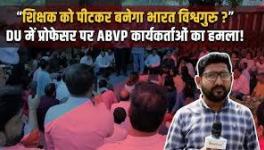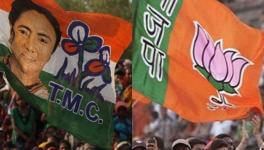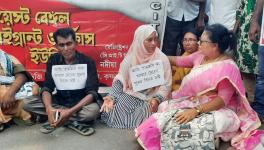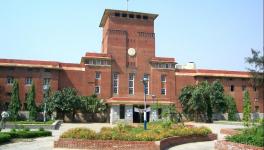Com. Mahendra Singh: Organiser and Teacher of the Democratic Movement in Delhi
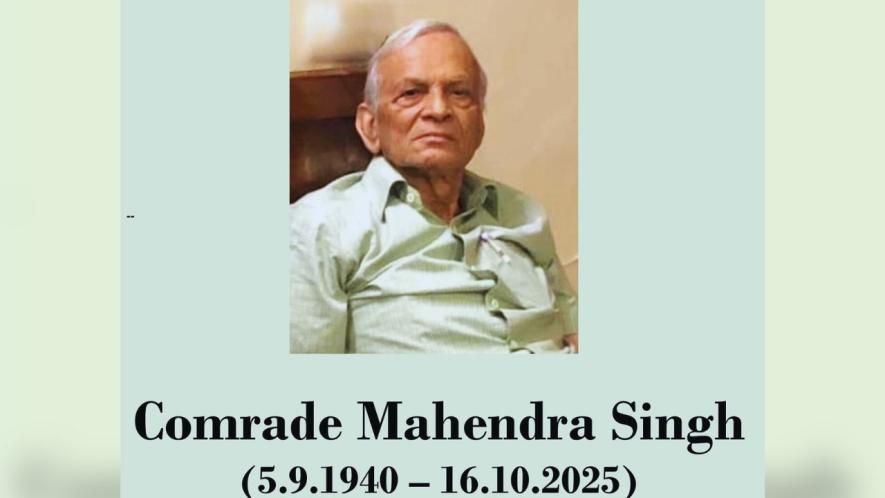
Comrade Mahendra Singh was an integral part of the teachers’ movement in the University of Delhi for over four decades. His life exemplified an exceptional synthesis of scholarship, conviction, organisation, and humility—qualities that made him not only a revered teacher of Marxist Political Economy but also a pillar of the Left and democratic movement within and beyond the University. His passing in October 2025 is a great loss to all segments of the democratic movement.
Born in 1940, Com. Mahendra Singh was an outstanding student. He completed his B.A. (Hons.) in Economics from St. Stephen’s College, where he famously mastered the full text of Alfred Marshall's tome ‘Principles of Economics’. He went on to complete his M.A. in Economics from the Delhi School of Economics, and remarkably, he also earned a second Master’s degree in Political Science from the University of Delhi in 1967—a reflection of his wide intellectual curiosity and interdisciplinary depth.
He began his teaching career at the School of Correspondence Courses (now the School of Open Learning) in 1963. He joined the Communist Party of India (Marxist) in 1967, during the early years of the party’s efforts to establish its state unit in Delhi. When Satyawati College was established in 1972, he joined as one of its founding teachers—indeed, primus inter pares—and continued there until his retirement in September 2005.
Com. Mahendra Singh was elected to the Delhi University Teachers’ Association (DUTA) Executive in 1969, in what was only the second DUTA election ever held. Thereafter, he dedicated himself entirely to building the Left and democratic movement among the working people of Delhi, particularly focusing on organising teachers and students. He became a member of the Delhi State Committee of the CPI(M) in 1978 and continued in that capacity until 2011. He also served on the State Secretariat of the CPI(M) from 1995 to 2011 and was later a special invitee to the Party’s leadership bodies.
Com. Mahendra Singh was a founding member of the Democratic Teachers’ Front (DTF) in 1979 and served as its in-charge for decades. His political and ideological leadership of the teachers’ movement was immense. He also oversaw the political education of CPI(M) members, effectively formulating and implementing the Party’s policies at the state level. He played a guiding role in the Delhi Party Centre of the CPI(M), offering calm and visionary leadership during critical moments.
He had a rare gift for recruiting and mentoring young activists, nurturing them into future leaders of the democratic movement. He inspired generations of students and teachers to join the struggle for justice, reminding all that such struggles must be waged with patience, principle, and collective organisation.
For the teachers’ movement, Com. Mahendra Singh was both an anchor and a guide. His signal contribution during critical junctures, including the historic 109-day DUTA strike of 1982, reflected his calm leadership and ideological clarity. It is not widely known, but DUTA, after that victorious strike, ensured that teaching and examinations in the University were completed in the same academic year without loss to any section of the university community.
At Satyawati College, Com. Mahendra Singh was not only an excellent teacher but also a leader and institution-builder. He often served as acting principal and guided the college through crises with integrity and foresight. Under his democratic stewardship, Satyawati College became a vibrant centre of secular and egalitarian values. It was among the few colleges in the University of Delhi where collective functioning was institutionalised through the Staff Council, even extending to the election of the Bursar.
He gathered around him a galaxy of Left and like-minded teachers who ensured that the college remained a space for progressive practices. He played a pivotal role in building several departments, most notably the Department of Economics, which under his guidance began offering the honours programme.
His patience and compassion were legendary. Once, when a colleague resigned after a minor disagreement, he quietly retrieved the resignation letter and persuaded the colleague to stay—a small but telling instance of his deep belief in collective strength and solidarity.
Com. Mahendra Singh’s leadership in DUTA, DTF, and the CPI(M) is well known, but his quiet legacy as a mentor of minds is equally enduring. Generations of students remember him as an exceptional teacher of Marxism—rigorous, lucid, and profoundly humane. His lectures on political economy and historical materialism drew students across disciplines, bringing abstract ideas to life with clarity, insight, and conviction.
One of the co-authors of this tribute was among his students in the early 2000s and recalls his lectures as transformative windows into understanding not only economics but the world itself. His powerful voice carried conviction and compassion, commanding attention not through authority but through clarity of thought and purpose. He made students grasp not only the subject but also the life and politics beyond it.
He remained generous in his affection, using social media in his later years to renew personal ties and remember former students with warmth. Even in his later years, he continued to guide, advise, and inspire. His intellectual and moral presence continues to provide guidance in classrooms, movements, and collective memory.
Com. Mahendra Singh’s simplicity, uprightness, and soft-spoken warmth could never conceal his nerves of steel or his unwavering commitment to Marxist politics. He leaves behind a legacy of Marxist scholarship and progressive thought that will continue to inspire struggles for a more democratic, inclusive, and humane world—especially for the marginalised and the disadvantaged.
Shirin Akhter is Associate Professor at Zakir Husain Delhi College, University of Delhi. She was a student of Comrade Mahendra Singh. C. Saratchand is Professor, Department of Economics, Satyawati College, University of Delhi. He was a colleague of Comrade Mahendra Singh. The views are personal.
Get the latest reports & analysis with people's perspective on Protests, movements & deep analytical videos, discussions of the current affairs in your Telegram app. Subscribe to NewsClick's Telegram channel & get Real-Time updates on stories, as they get published on our website.















